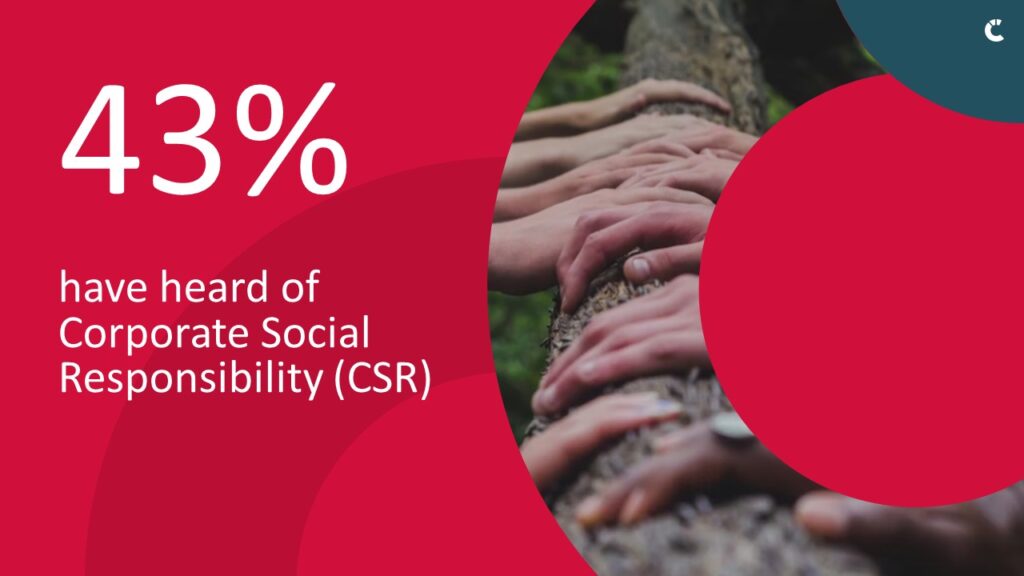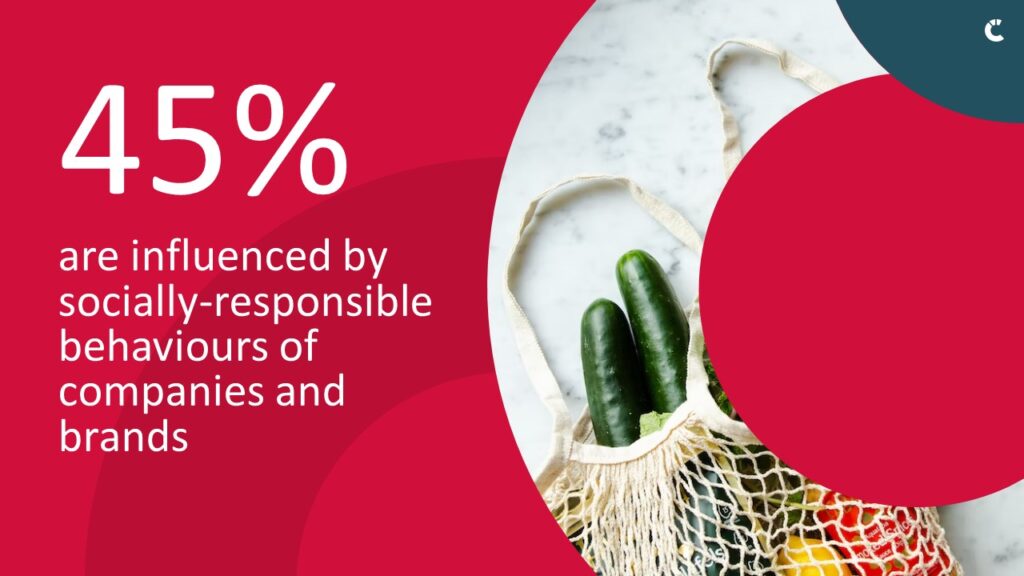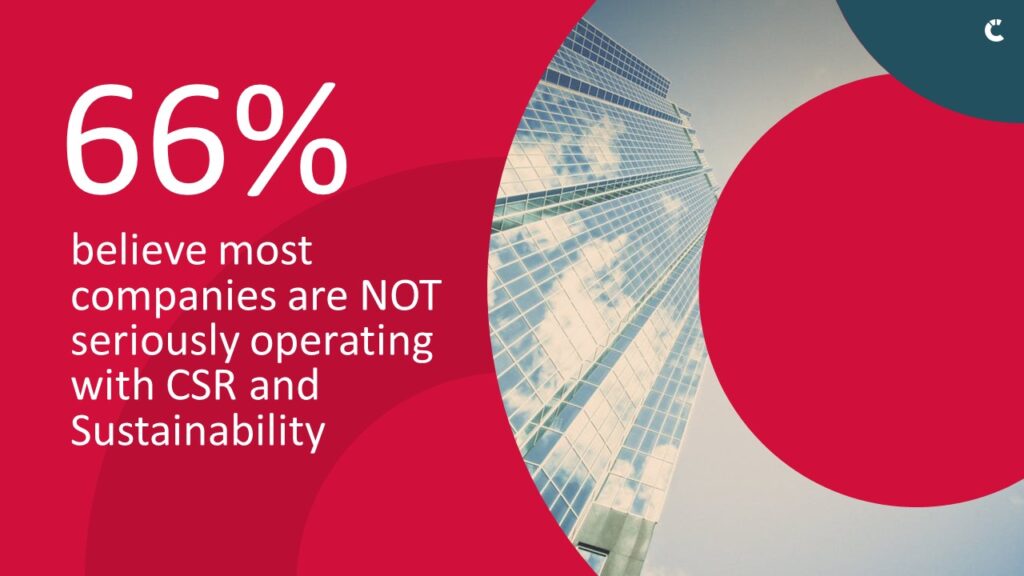Influence of company/brand CSR credentials on purchasing decisions is weakened amidst cost of living crisis
- Awareness in Ireland of Corporate Social Responsibility grows in 2022.
- Decline in those who report being influenced by socially-responsible companies/brands in their purchasing decisions.
- Nearly half still believe companies are not seriously operating with CSR & Sustainability, but that it is only for appearance.
WIN International, the world’s leading global association in market research and polling (with RED C as the member in Ireland), has published the Annual WIN World Survey – WWS 2022 – exploring the views and beliefs of 29,269 individuals among citizens from 36 countries about Corporate Social Responsibility (CSR). What do people know about it? Is it important when making purchase decisions?
HEADLINES – IRELAND
General Knowledge about CSR
- There is a significant increase (+5%) among Irish adults of having heard Corporate Social Responsibility before vs. 2021. The growth is driven by increases seen among males, higher social grades, those living in Dublin, and those aged 18-34 and 55+.
- Majority (56%) have not heard of corporate social responsibility before or are unsure of it, with knowledge weakest among women & those lower social grades.
- On a global level, knowledge around CSR is weaker among Irish than other countries.

The influence of CSR
- In the thick of the cost of living crisis, the Irish are evidently less likely to be influenced of socially responsible behaviour of companies/brands while making a purchase.
- The influence has weakened notably among women (-10%), those aged 35-54 (-11%), lower social grades (-11%), those living in rest of Leinster (-11%) and Conn/Ulster (-14%).
- Compared to the global norms too, impact of social behaviours is weaker on Irish.

Efforts to embrace and promote CSR
- Only a small minority (13%) believe that companies are seriously operating with CSR & sustainability. This outlook is relatively similar across demographic groups, suggesting that people expect more efforts to be taken by businesses.
- Just under half (47%) also state that socially responsible behaviour among companies is just for appearance. This belief is higher among males (54%) and ABC1 (53%).
- Those in Ireland are more likely to think that efforts are for appearances vs. the global average.

Richard Colwell, CEO of RED C Research and Vice-President of WIN International Association, said:
“It is perhaps no surprise, that alongside sustainability, consumers are less concerned with corporate responsibility when struggling to make ends meet. Of more concern to business must be the fact that so few consumers believe that companies really care about their CSR, and instead are simply doing this for appearances.”
HEADLINES WORLD
- Increase in awareness.
51% of respondents have heard about CSR before, with an increase of 3% compared to last year. Companies and corporations’ responsibility towards society and the environment is becoming an important part of the conversation, leading to higher awareness of CSR among citizens worldwide.
Respondents’ level of education is directly linked to their level of awareness: higher education means higher awareness of CSR.
On a regional level, this varies. Europe is at the top with the highest awareness increase (+6%) compared to the previous year; followed by the Americas +3%. On the other hand, the MENA regions are less familiar with the concept, with 59% of people not knowing what CSR stands for.
- Companies aren’t doing enough.
Respondents are becoming more skeptical. When asked how much companies embrace and promote CSR, 42% believe that companies are not seriously embracing CSR and that the actions in place are only made for appearance (+3% compared to 2021). 25% also believe that most companies do not care about CSR at all, unchanged compared to the previous year.
Only 16% believe that brands are seriously following CSR guidelines, the more trusting region is APAC with24% of people believing in companies’ efforts, and countries like Malaysia, Philippines and India also following this line of thought.
- Decrease in CSR’s influence on purchase decisions.
Surprisingly, less people compared to last year are influenced by companies’ CSR efforts when buying products and services. Distrust towards brands translates to a wider disinterest in guiding purchase decisions based on those efforts. CSR influence on purchase decision dropped from 62% to 50%, but results vary significantly among countries. India (82%), Mexico (71%) and Turkey (67%) show the highest levels of influence of CSR on purchase decisions. While Kenya (71%), Netherlands (66%) and South Korea (60%) appear to be the most skeptical countries.
When making purchase decisions Africa (51%) and Europe (47%) are the least influenced continents by CSR.
Vilma Scarpino, President of WIN International Association, said:
‘We are learning from every edition of our WIN World Survey that people are increasingly more worried about the environment and that they want to act upon this concern, and call companies, institutions, and governments to help. However, at the same time, a wide distrust towards international actors and their role in taking care of society and the environment is increasing, leading to citizens not even considering companies’ CSR efforts in their everyday purchase decisions. We need to make sure that the widely accepted concerns about society and the environment have a direct effect on everyone’s actions and rely at the same time on the fact that increasingly more people are familiar with the definition of Corporate Social Responsibility. Those who are getting familiar with the concept now, should also make sure to keep the value in mind when making purchase decisions.’
-ENDS-
Media enquiries:
IRELAND DATA
Richard Colwell, C.E.O., RED C Research
Derek Bell, Associate Director, RED C Research
+35318186316
[email protected]
WORLDWIDE DATA
Elena Crosilla, WIN Coordinator
+39 335.62.07.347
E-mail: [email protected]
NOTES FOR EDITORS
Methodology:
The survey was conducted in 36 countries using CAWI / CATI / F2F/ TAPI /online survey methods.
Sample Size and Mode of Field Work:
A total of 29,739 people were interviewed. See below for sample details. The fieldwork was conducted during October 9th and December 10th, 2022. The margin of error for the survey is between 4.4 and 2.5 at 95% confidence level.
The global average has been computed according to the covered adult population of the surveyed countries.
About WIN:
The Worldwide Independent Network of Market Research (WIN) is a global network conducting market research and opinion polls in every continent.
Our assets
- Thought leadership: access to a group of the most prominent experts and business entrepreneurs in Market Research, Polling and Consultancy
- Flexibility: tailor-made global and local solutions to meet clients’ needs
- Innovation: access to the latest strategic consultancy, tool development and branded solutions
- Local experts: access to a network of experts that truly understand the local culture, market and business needs.
- Trust: highest quality of talented members in all countries covered
In the years, WIN has demonstrated wide competences and ability to conduct multi-country surveys following the highest standards requested by the market. The accumulated expertise of the Association is formidable: among others, researched themes are gender equality and young people, communication and media research, and brand studies.
Click here to Download CSR Irish Results
Click here to Download CSR Press Release
